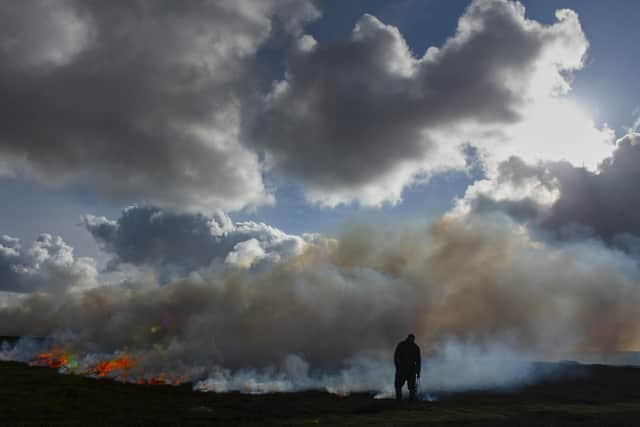Government urged by RSPB to make good on promise to end peatland burning as season starts
The call by conservation charity the RSPB and backed by city mayors, councils and environmental groups comes as the season when peatland can be legally burned to manage the land to support grouse starts on October 1.
Conservationists say healthy wet blanket peat bogs are home to spagnum mosses, cotton grasses and carnivorous plants and supports breeding birds such as curlew.
Advertisement
Hide AdAdvertisement
Hide AdBut they say burning the peat to ensure new green shoots of heather the grouse favour releases carbon into the atmosphere and degrades the peat, harms the habitat and makes it less able to store water and prevent flooding.
The Government has said burning of protected blanket bog needs to be phased out, and the RSPB said it needs to make good on its pledge. One Yorkshire council with moorland on its patch said legislation needed to be introduced "promptly".
Beccy Speight, RSPB chief executive, said: "In a climate and ecological emergency, the continued burning of precious peatlands is simply not acceptable and undermines the UK Government's legal obligations to restore nature.
"The Government has long promised to end the burning of peat, it has widespread public support, and the Secretary of State, George Eustice, now needs to make good on this pledge."


Advertisement
Hide AdAdvertisement
Hide AdJamie Driscoll, mayor of the North of Tyne Combined Authority, said: "Burning upland peat habitats is a destructive process. It results in greenhouse gas emissions, brings flood risks, and is damaging to wildlife."
And Councillor Scott Patient, lead on climate change and resilience at Calderdale Metropolitan Borough Council, said: "In Calderdale, we know that moorland fires have a broad range of ecological and public health impacts including degrading peatlands, releasing harmful gasses into the atmosphere and surrounding valleys, putting added pressure on our fire services (themselves stretched throughout the pandemic) and decreasing biodiversity whilst possibly contributing to flooding in communities downstream.
"We hope to see legislation introduced promptly to end the use of burning in the management of grouse moors."
In March, a campaign group dedicated to safeguarding the North York Moors reignited the dispute over heather burning on the protected landscape by suggesting alternative methods should be used to encourage grouse breeding.
Advertisement
Hide AdAdvertisement
Hide AdTom Chadwick, chairman of the North Yorkshire Moors Association, wrote in its magazine 'Voice of the Moors' that there was “gathering moment of opinion” that moorland burning was no longer an acceptable form of moorland management.
Gareth Dockerty, British Association for Shooting and Conservation uplands officer, said: “There is no one size fits all solution to our diverse and precious peatlands, we need all management options available to us now more than ever. The most recent research is showing that controlled burning can provide protection against devastating wildfires and can sequester that all-important carbon at a faster rate than mowing or no management.
“There continue to be plenty of unknowns in the debate, what is certain is that no decision to ban should be made until we understand the full consequences.”
A Defra spokesperson said: “Healthy peatlands have an important role to play in cutting greenhouse gas emissions and helping us reach our net zero target, which is why we are committed to restoring 35,000 hectares of England’s peatland by 2025.
“We have always been clear of the need to phase out rotational burning of protected blanket bog to conserve these vulnerable habitats, and we are looking at how legislation can achieve this.”
Comment Guidelines
National World encourages reader discussion on our stories. User feedback, insights and back-and-forth exchanges add a rich layer of context to reporting. Please review our Community Guidelines before commenting.